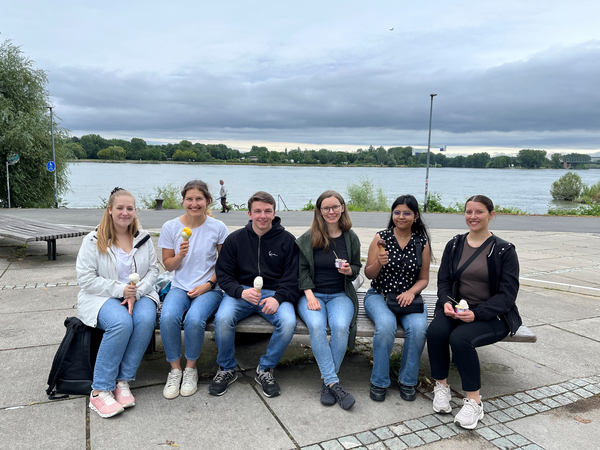Projects Offered
Helle Ulrich Helle Ulrich_actin Helle Ulrich_4R Christof Niehrs_Bioinfo Christof Niehrs_4R Christof Niehrs_Ageing SvenDanck_4R Jan Padeken_4R Andreas Wachter_4R Roopesh Anand_4R Petra Beli_4R Brian Luke_4R Dorothee Dormann_4R Thomas Hofmann_4R Maria Felicia Basilicata_4R Katja Luck Sina Wittmann Sandra Schick Stamatis Papathanasiou Ari Waisman Wolfram Ruf Uwe Wolfrum Johannes Mayer_SkinDC Johannes Mayer_Exhaust Johannes Mayer_APCThe Role of Protein Condensation in Gene Activation
1 PhD project offered in the IPP winter call Molecular Mechanisms in Genome Stability & Gene Regulation
Scientific Background
Transcription is one of the most fundamental processes of all cellular life. Precise regulation in time and space is needed for proper development and to adequately react to environmental changes. The regulation of gene activation is achieved via a complex, multi-step process that starts by the recognition of DNA enhancer elements through gene-specific transcription factors which recruit downstream factors that help position RNA polymerase II correctly at the transcription start site for RNA synthesis to begin. Recently, it was discovered that transcription initiation sites constitute protein condensates with liquid-like properties. This exciting new finding has attracted much attention in the transcription community, as it can potentially explain cellular observations that were puzzling previously. This includes the simultaneous firing of different genes or the bursting behaviour of transcription. While we recently succeeded in reconstituting the formation of such condensates in vitro using transcription factors, little is known about the condensates function or regulation inside cells. Furthermore, cellular condensates are incredibly complex containing thousands of different proteins and how their composition is regulated is not fully understood.
PhD Project: Investigating the function of transcription factor condensation during gene activation
I started my research group at IMB in September 2023 and am looking for a motivated PhD student to join our growing team. We are trying to understand how initiation condensates regulate gene expression. For this, we are planning to reconstitute initiation condensates in a stepwise manner in the test tube using state-of-the-art surface assays (see Quail et al. and Morin et al.). To achieve this, we will use different biochemical methods including protein purification and characterization, reconstitution of condensates on DNA, and DNA binding assays and will, later on, combine this with techniques inside cells to investigate the effect of condensation on gene expression. Here, mammalian tissue culture will be utilized to perform a variety of genome-wide methods (e.g. ChIP-Seq, RNA-Seq, ATAC-Seq). Different collaboration inside and outside Mainz which will include physics groups will ensure the interdisciplinarity of our investigations.
Using this approach, we will be able to address some of the following questions: How is the composition of initiation condensates regulated? What is the role of nucleosomes in their formation? What consequences does condensate formation have for epigenetic marking? What biochemical mechanism triggers condensation on DNA? And ultimately, what is their role in controlling gene expression programs during differentiation? As a PhD student in the group, you would focus on one such question and try to decipher it by combining in vitro and in vivo approaches.
If you are interested in this project, please select Wittmann as your group preference in the IPP application platform.
Publications relevant to the projects
Morin JA, Wittmann S, Choubey S, Klosin A, Golfier S, Hyman AA, Jülicher F, Grill SW. (2022) Surface condensation of a pioneer transcription factor on DNA. Nat Physics, 18: 271–276 Link
Wittmann S, Alberti S. (2019) ERα condensates: chronic stimulation is hard to ignore. Nat Struct Mol Biol 26(3): 153-154 Link
Wittmann S, Renner M, Watts BR, Adams O, Huseyin M, Baejen C, El Omari K, Kilchert C, Heo DH, Kecman T, Cramer P, Grimes JM, Vasiljeva L. (2017) The conserved termination factor Seb1 bridges RNA polymerase II and nascent RNA. Nat Commun 8: 14861 Link
Quail T, Golfier S, Elsner M, Ishihara K, Murugesan V, Renger R, Jülicher F, Brugués J. (2021) Force generation by protein–DNA co-condensation. Nat. Phys. 17, 1007–1012 Link
Sabari BR, Dall'Agnese A, Young RA. (2020) Biomolecular Condensates in the Nucleus. Trends Biochem Sci. 45(11):961-977. Link
